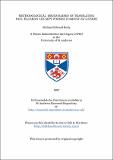Methodological issues raised by translating Paul Éluard's Les sept poèmes d'amour en guerre
Abstract
Within the general field of translation studies, the translation of poetry has perhaps led to more discussion than any other single topic, as well as to a very wide and diverse range of translation approaches and strategies. However, it often seems that the more extreme of these approaches have been defined with greater clarity than the unsystematic, compromise approaches adopted in practice by most translators. This thesis examines a translation 'middle ground', proposing an approach to the translation of poetry which considers textual elements of content and expression not in isolation from one another but rather in terms of their functional interaction in the overall effect of both source- and target-text, aiming in this way to minimise translation loss in the translation of any given poetic source-text. This approach is developed and demonstrated in a practical way, through an examination of the translation of Paul Éluard's Les sept poèmes d'amour en guerre. Following the most comprehensive study of the seven-poem series yet undertaken, the thesis examines in detail two published translations of the series, analysing the strengths and weaknesses of the approach adopted by each translator. This then leads on to the practical application of this information, in the production and analysis of a new translation of the series using the 'middle ground' approach to translation advocated by the thesis. The appendices to the thesis include an alphabetic directory of published English-language translations of Éluard poems.
Type
Thesis, PhD Doctor of Philosophy
Description
The electronic copy of this thesis des not contain appendices 2 and 3Collections
Items in the St Andrews Research Repository are protected by copyright, with all rights reserved, unless otherwise indicated.

